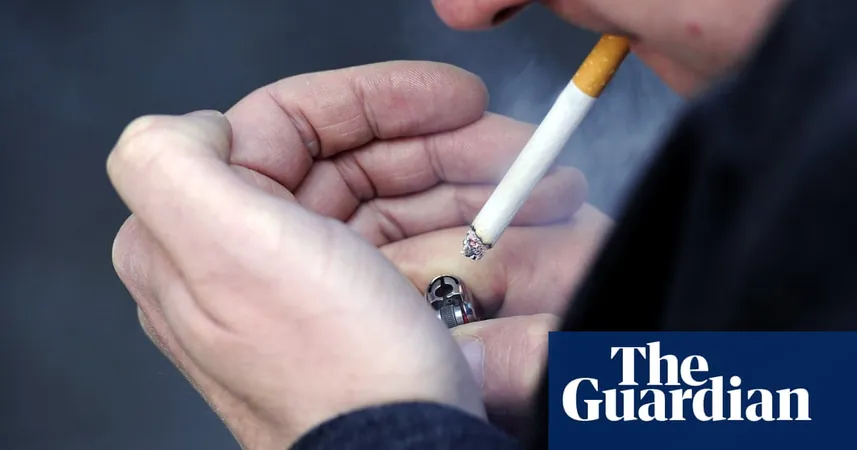
Alarming Rise in Childhood Obesity Treats Young Kids in England: A Public Health Crisis Unfolds!
2024-11-05
Author: John Tan
In a shocking revelation, recent statistics indicate that thousands of children as young as two years old in England are undergoing treatment for severe health complications related to obesity. Leading health experts have raised serious concerns, labeling the alarming trend as an “escalating public health crisis.
According to NHS data, the situation appears grim, with one in ten children entering primary school suffering from obesity. The prevalence among reception-age children stood at 9.6% for 2023-24, showing an increase from 9.2% the previous year. While there was a slight dip in obesity rates among year 6 children (those aged 10-11), from 22.7% to 22.1%, these figures remain significantly higher than pre-pandemic levels (21% in 2019-20).
The NHS England has reported spending an astonishing £6.5 billion annually to combat obesity-related health issues across various age groups in the country. To tackle this growing concern, the NHS has introduced an array of services aimed at supporting children and their families. This includes 30 specialized clinics dedicated to children aged two to 18, providing solutions for health issues stemming from severe obesity. These clinics offer individualized treatment plans that encompass diet management, mental health support, and lifestyle coaching.
Prof. Simon Kenny, the National Clinical Director for Children and Young People at NHS England, expressed his deep concerns regarding the statistics. He highlighted the dire consequences of obesity on a child’s health, labeling it as a “ticking health timebomb" that elevates risks for serious conditions such as type 2 diabetes, various cancers, mental health disorders, and more.
The chair of the National Obesity Forum, Tam Fry, echoed these sentiments, describing the reported figures as "very concerning." He underscored the severity of obesity-related comorbidities which can lead to critical health issues far beyond obesity itself, including heart diseases and certain cancers.
New data from the government’s national child measurement program, released recently, pointed to a troubling disparity in obesity levels based on socio-economic status. In the most deprived areas, 12.9% of reception-age children are classified as obese, more than double the rate of those in the least deprived areas (6%). For year 6 children, the statistics were even starker—obesity stood at 29.2% in the most deprived areas compared to 13% in better-off regions.
The Local Government Association posits that the revenue generated from the soft drinks sugar tax should be invested in areas most affected by child obesity and related health issues. There’s a growing push to expand this tax to cover milkshakes, sugary coffees, and other high-calorie treats.
Katharine Jenner, director of the Obesity Health Alliance, lamented the dominance of unhealthy food options in our everyday environments, which significantly contribute to the worrying escalation of childhood obesity in England. "Every child should have access to affordable and delicious food," she emphasized, insisting on the urgent need for change.
Sonia Pombo, a nutritionist and campaign lead at Action on Salt and Action on Sugar, pointed out that the upward trend in childhood obesity reflects a “public health crisis.” She urged immediate action, criticizing the previous government’s lack of proactive health policies and underscoring the responsibility of the new government to implement effective, long-lasting changes.
Additionally, reports have surfaced highlighting a critical delay in governmental action. A recent Guardian investigation discovered that children faced heightened health risks because Conservative ministers postponed anti-obesity measures until 2025.
In response to these findings, public health minister Andrew Gwynne stated, "Our widening waistlines are costing the NHS and the economy billions of pounds, setting kids up for an unhealthy life." He outlined measures to curb this crisis, including restrictions on junk food advertising and limiting schoolchildren’s access to fast food, as well as banning energy drinks for those under 16.
As the obesity epidemic looms larger, experts and officials alike call for urgent public policy interventions and societal changes to safeguard the health of future generations. The time to act is now, before the ticking timebomb of obesity explodes with devastating consequences.




 Brasil (PT)
Brasil (PT)
 Canada (EN)
Canada (EN)
 Chile (ES)
Chile (ES)
 España (ES)
España (ES)
 France (FR)
France (FR)
 Hong Kong (EN)
Hong Kong (EN)
 Italia (IT)
Italia (IT)
 日本 (JA)
日本 (JA)
 Magyarország (HU)
Magyarország (HU)
 Norge (NO)
Norge (NO)
 Polska (PL)
Polska (PL)
 Schweiz (DE)
Schweiz (DE)
 Singapore (EN)
Singapore (EN)
 Sverige (SV)
Sverige (SV)
 Suomi (FI)
Suomi (FI)
 Türkiye (TR)
Türkiye (TR)